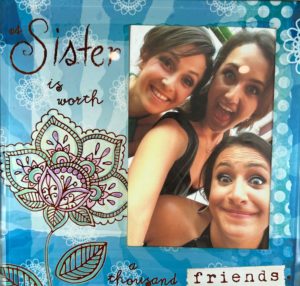I once read a random statistic that said most people will spend 80% to 100% of their life with their siblings. But not all of us are so fortunate. For a large majority of my life, my big sister will be gone.
On June 18th, 2018, at the age of 27, I joined the ranks of mourning siblings when my 29-year-old sister, Maya, took her own life. On that day, I didn’t just lose my sister; I lost one of my best friends. I lost one of my biggest supporters, and I lost a person that I thought was going to be by my side throughout the entirety of my life. I did the math, and if I live to be 100, I’ll only have spent 27% of my life with my big sister by my side. Since she died, I’ve already spent 4% of my life without her.
The loss of 1,000 friends
Back in 2014, my sister gave me a frame that had a picture of the two of us with our little sister, Shany. It said, “a sister is worth 1,000 friends,” and I now know how true that is. On the day she died, I was suddenly short 1,000 friends.

Hila (bottom) with her sisters Maya (top) and Shany (middle)
Even though my big sister is gone, I still find myself talking to her from time to time, asking her for advice, wishing she was here to guide me, comfort me, encourage me, and support me. I don’t just think of her in big moments. I also think about her in small day-to-day moments: when I play with my dog, see old friends, see my family, or hear a Shania Twain song blasting on the radio or any heartfelt love song. I think of her when I talk about my childhood or my college days because she was a crucial part of so many of my stories from then.
She recently crossed my mind in the middle of a yoga class that I took with my little sister and partner. As I looked in the mirror and saw the three of us standing there, it felt like someone was missing. Maya was missing. She would’ve loved being a part of that class (apart from the 95-degree heat) because she loved spending time with us and she loved yoga, so what could be better than the two together?
In January I was diagnosed with Celiac disease, and one of the first thoughts was that Maya would know how to help me. She was into gut-healing and wellness long before it became mainstream. At the time I thought she was a nutrition heretic, but now I know that she was actually just ahead of our time. She was constantly learning and reading anything she could get her hands on; she is the reason why I know anything about nutrition. On this new Celiac journey I know we would’ve been able to bond about new recipes and different supplements. Maya would understand my new struggles because she had health concerns of her own and I could finally understand her a bit more too.
I also thought about how Celiac disease can often be triggered by trauma, and how maybe if my sister were still alive, I might not be dealing with this right now.
The forgotten mourners
Although siblings play a huge part in our lives, when it comes to grief, sibling loss is often forgotten or overlooked. We are known as the “forgotten mourners” because people focus more on the parents’ (or spouses’ or children’s) struggles. We are asked how our parents are doing and are often told to “stay strong” for them. Hearing things like this makes us feel as though our grief isn’t as bad or that our loss isn’t as significant. It also puts so much pressure on a person to make sure that their grief and loss does not create any additional pain for their parents.
In the aftermath of my sister’s death, I put so much pressure on myself to be “okay” and to show the world that although my sister died, nobody had to worry about me. But what I should have been doing is allowing myself to feel and move through my grief in a way that felt supportive for me. While it is extremely painful to lose a child, it’s also extremely painful to lose a sibling and comparing grief is unnecessary.
We sibling mourners come with our own grief, our own connection to the person who died, and our own path forward. If you know someone in your life who had a sibling die, I encourage you to talk to them about it. Ask them to tell you a story about their sibling. Ask them what it was like to grow up with them. If they don’t feel like talking to you about it, just give them the space to be in their feelings and remind them that they are seen by you. And for those of you who have living siblings, go give them a hug.
Hila Yasur has been volunteering with Experience Camps since 2019. She joined the Experience Camps community after her sister died by suicide in 2018. Hila is also a member of our South Florida Regional Advisory Council; she ran the NYC half marathon on our behalf, and was our 2021 Miami Gala Chair. Hila is an alumni of the University of Miami, and enjoys cooking, traveling (especially to Israel and Guatemala where she’s from), and playing with her dog.
